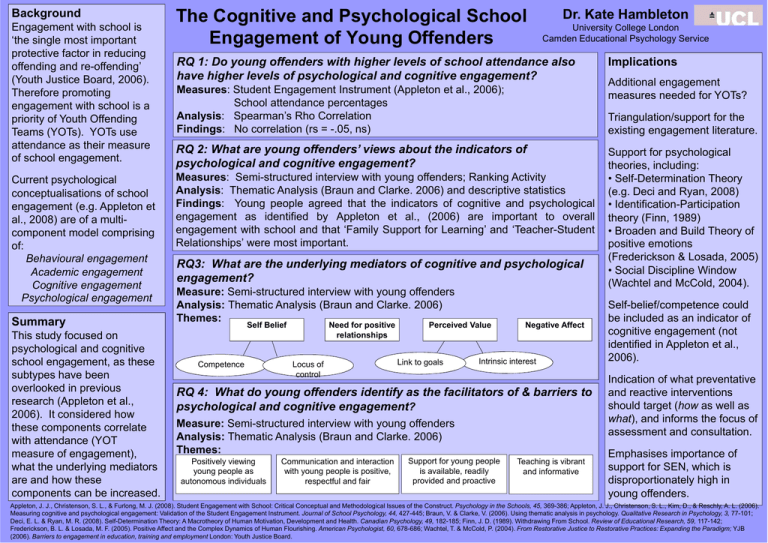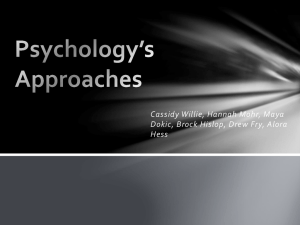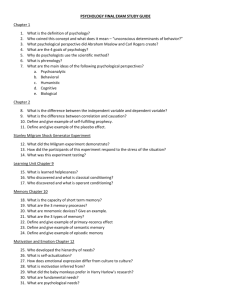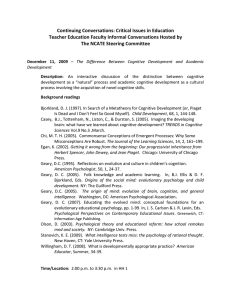The Cognitive and Psychological School Engagement of Young Offenders Dr. Kate Hambleton Background
advertisement

Background Engagement with school is ‘the single most important protective factor in reducing offending and re-offending’ (Youth Justice Board, 2006). Therefore promoting engagement with school is a priority of Youth Offending Teams (YOTs). YOTs use attendance as their measure of school engagement. Current psychological conceptualisations of school engagement (e.g. Appleton et al., 2008) are of a multicomponent model comprising of: Behavioural engagement Academic engagement Cognitive engagement Psychological engagement Summary This study focused on psychological and cognitive school engagement, as these subtypes have been overlooked in previous research (Appleton et al., 2006). It considered how these components correlate with attendance (YOT measure of engagement), what the underlying mediators are and how these components can be increased. The Cognitive and Psychological School Engagement of Young Offenders Dr. Kate Hambleton University College London Camden Educational Psychology Service RQ 1: Do young offenders with higher levels of school attendance also have higher levels of psychological and cognitive engagement? Measures: Student Engagement Instrument (Appleton et al., 2006); School attendance percentages Analysis: Spearman’s Rho Correlation Findings: No correlation (rs = -.05, ns) Measures: Semi-structured interview with young offenders; Ranking Activity Analysis: Thematic Analysis (Braun and Clarke. 2006) and descriptive statistics Findings: Young people agreed that the indicators of cognitive and psychological engagement as identified by Appleton et al., (2006) are important to overall engagement with school and that ‘Family Support for Learning’ and ‘Teacher-Student Relationships’ were most important. RQ3: What are the underlying mediators of cognitive and psychological engagement? Self Belief Competence Need for positive relationships Locus of control Perceived Value Link to goals Negative Affect Intrinsic interest RQ 4: What do young offenders identify as the facilitators of & barriers to psychological and cognitive engagement? Measure: Semi-structured interview with young offenders Analysis: Thematic Analysis (Braun and Clarke. 2006) Themes: Positively viewing young people as autonomous individuals Communication and interaction with young people is positive, respectful and fair Support for young people is available, readily provided and proactive Additional engagement measures needed for YOTs? Triangulation/support for the existing engagement literature. RQ 2: What are young offenders’ views about the indicators of psychological and cognitive engagement? Measure: Semi-structured interview with young offenders Analysis: Thematic Analysis (Braun and Clarke. 2006) Themes: Implications Teaching is vibrant and informative Support for psychological theories, including: • Self-Determination Theory (e.g. Deci and Ryan, 2008) • Identification-Participation theory (Finn, 1989) • Broaden and Build Theory of positive emotions (Frederickson & Losada, 2005) • Social Discipline Window (Wachtel and McCold, 2004). Self-belief/competence could be included as an indicator of cognitive engagement (not identified in Appleton et al., 2006). Indication of what preventative and reactive interventions should target (how as well as what), and informs the focus of assessment and consultation. Emphasises importance of support for SEN, which is disproportionately high in young offenders. Appleton, J. J., Christenson, S. L., & Furlong, M. J. (2008). Student Engagement with School: Critical Conceptual and Methodological Issues of the Construct. Psychology in the Schools, 45, 369-386; Appleton, J. J., Christenson, S. L., Kim, D., & Reschly, A. L. (2006). Measuring cognitive and psychological engagement: Validation of the Student Engagement Instrument. Journal of School Psychology, 44, 427-445; Braun, V. & Clarke, V. (2006). Using thematic analysis in psychology. Qualitative Research in Psychology, 3, 77-101; Deci, E. L. & Ryan, M. R. (2008). Self-Determination Theory: A Macrotheory of Human Motivation, Development and Health. Canadian Psychology, 49, 182-185; Finn, J. D. (1989). Withdrawing From School. Review of Educational Research, 59, 117-142; Frederickson, B. L. & Losada, M. F. (2005). Positive Affect and the Complex Dynamics of Human Flourishing. American Psychologist, 60, 678-686; Wachtel, T. & McCold, P. (2004). From Restorative Justice to Restorative Practices: Expanding the Paradigm; YJB (2006). Barriers to engagement in education, training and employment London: Youth Justice Board.




